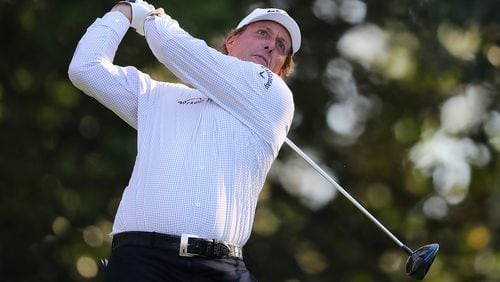Augusta National and the Masters, we know, reveres its history.
Even as it lurches into the modern age, it does old really well.
The course is reputed, unlike so many other work places in the real world, to actually value experience. And the older a player gets here, the more he inevitably quotes the value of that experience.
And, yet, there hasn’t been a Masters winner over the age of 40 this century. A subtle ageism has crept its way onto the grounds.
With the start of this 82nd version of the Masters, the odds may have shifted ever so slightly in the favor of the mid-life brigade.
"Maybe you bump them up a little bit with T-Dub," 2007's champion Zach Johnson said. That was 42-year-old's hipster way of referring to Tiger Woods.
The competitive dynamic has shifted this season. Old (relatively speaking) has become new again. The 42-year-old Woods has been the most visible torchbearer for the 40-somethings, his comeback from debilitating back problems dominating all media. But keep in mind also the March of time, when last month two of his peers, 47-year-old Phil Mickelson and 40-year-old Paul Casey won on consecutive weeks on Tour. Ian Poulter, 42, had a Hail Mary victory last week in Houston to gain last-minute entrance to his little picnic.
It is Mickelson who is poised to make the loudest noise among the old lions, as a win this week would make him the oldest ever Masters champion, edging past Jack Nicklaus who was 46 in ’86.
For this Masters, you could make the argument for one spirited generational scramble, should they ever decide to fiddle with the format. Hmmm, look at it. Maybe the elder generation could hold its own.
Team 20-something: Jordan Spieth, Justin Thomas, Rory McIlroy, Rickie Fowler.
Team Life Begins at 30: Dustin Johnson, Justin Rose, Sergio Garcia, Bubba Watson.
Team You Kids Get off my Lawn: Woods (42), Mickelson (47), Henrik Stenson (41), Casey (40).
“The 40-some-year-olds, the ones out there competing, we know what we’re doing,” Zach Johnson said. “I am so not-surprised that Phil played well (in Mexico). Really not surprised that Paul won, he’s been knocking on the door for two or three years now. Tiger was right there, too. I like where I’m at.
“There are a handful of guys who come to my mind who are 40 and over, that no doubt can win (at Augusta). We know he can win there.”
The youth vs. experience debate has always been a spirited one at Augusta National. There is the assumption that local knowledge of where to place the ball – and, more importantly, where not to place it – is so vital on this pitching, yawing greenery that the more you play it the better you should handle it.
But the results just haven’t favored the (relatively) old. Not since Mark O’Meara (41 at the time) won in 1998 has a 40-something slipped into a green jacket. Preceding him were Ben Crenshaw (43) in 1995, Jack Nicklaus (46) in 1986, Gary Player (42) in 1978, Sam Snead (41) in 1954 and Ben Hogan (40) in 1953.
Since O’Meara, the average age of the winners has suggested a nice compromise between youth and experience – 31.2.
We pause here for one warning from Garcia, the defending Masters champion: Experience is a double‑edged sword. On one hand, you understand the subtleties of this place. On the other, you know all too well the penalties for wandering from the preferred patches.
“The beautiful thing about not knowing too much about the course is that you haven't had too many bad experiences where you hit it in the water here or in the tree there or something like that. So, there's not as much scar tissue,” he said.
The Woods comeback has led the charge of the over-40 players, and elevated the discussion of what might be yet wrung from their aging, often damaged bodies. He was measured earlier this year as generating one of the fastest clubhead speeds on Tour – 129 miles per hour – after spinal fusion surgery.
There is great torque left in the old horse. “It's crazy. I'll be honest with you, it is crazy,” Woods said. “I thought prior to the fusion surgery that that's pretty much it. I'll have a nice, comfortable, and great life. But I'll never be able to swing the club like I used to speed‑wise.
“But all of a sudden, I have this pop and my body and my speed's back and my timing. I'm hitting speeds that I would hit in my prime.”
There are enough examples out there of guys who have stretched their careers beyond the average shelf life that this Masters could see an overdue elder champion. “I think it’s definitely a year it could change,” CBS’ Nick Faldo, three-time Masters champion, said.
“Science and players’ commitment to physical fitness, they’ve really taken it up a notch,” Faldo said. “It’s the commitment from the players, they know they have to do it. There are so many of them who are super fit, either to regain their mobility of hit the golf ball further.
“What Phil has proven, if you’ve still got your nerve, you can still play.”
Oh, it’s not going to be easy beating back the relentless energy of youth.
“It’s getting tougher. We see that on a yearly basis. New players coming out, hitting it farther and competition gets tougher and tougher,” Stenson said.
“It’s becoming a young man’s sport, so it’s very rewarding to be able to go up against the young guys and still compete with them,” Casey said.
It’s springtime, and these old guys are getting frisky. No, competitive life doesn’t begin at 40. But a committed few are making an ever-stronger case that it doesn’t have to end there, either.







